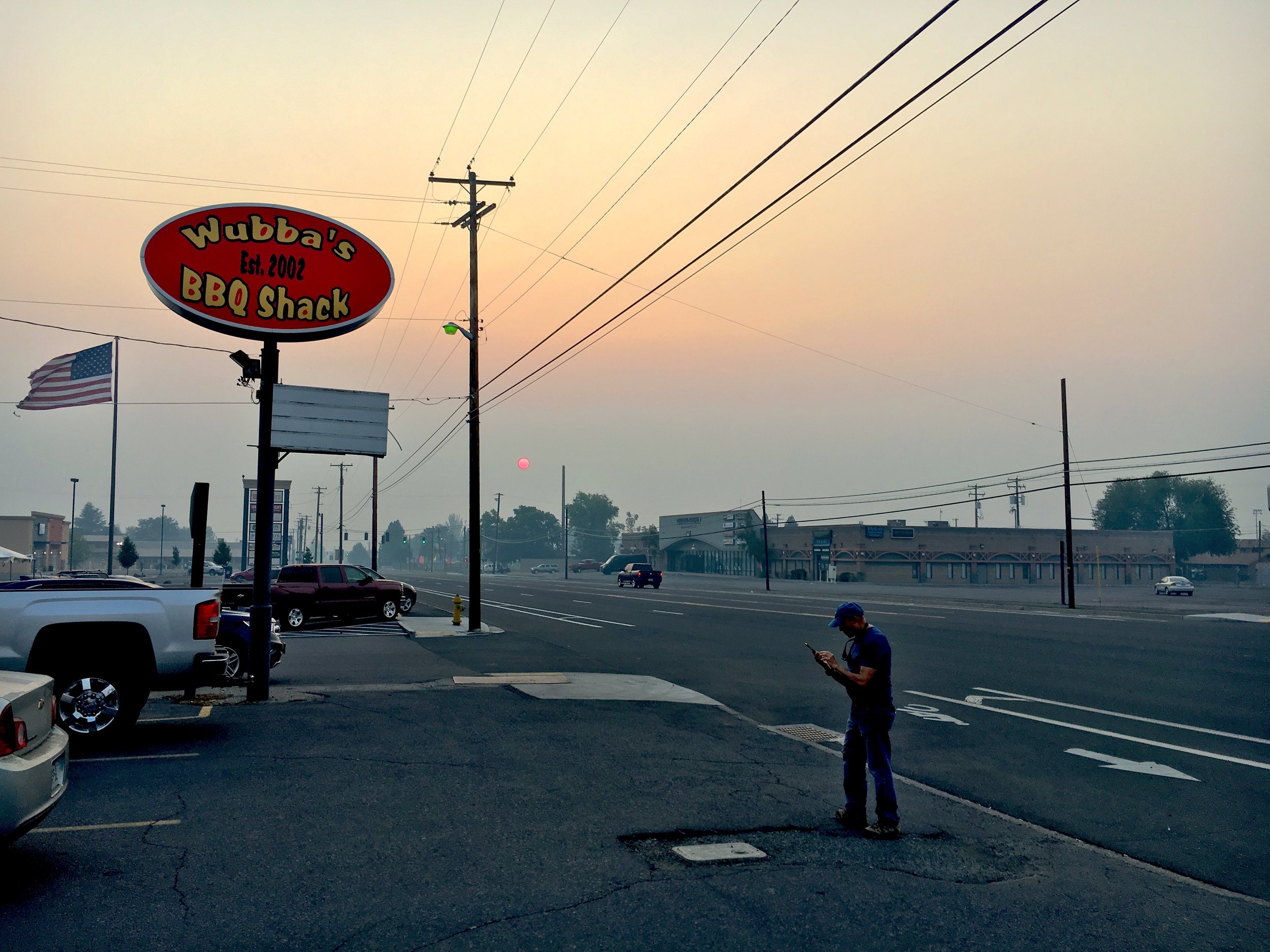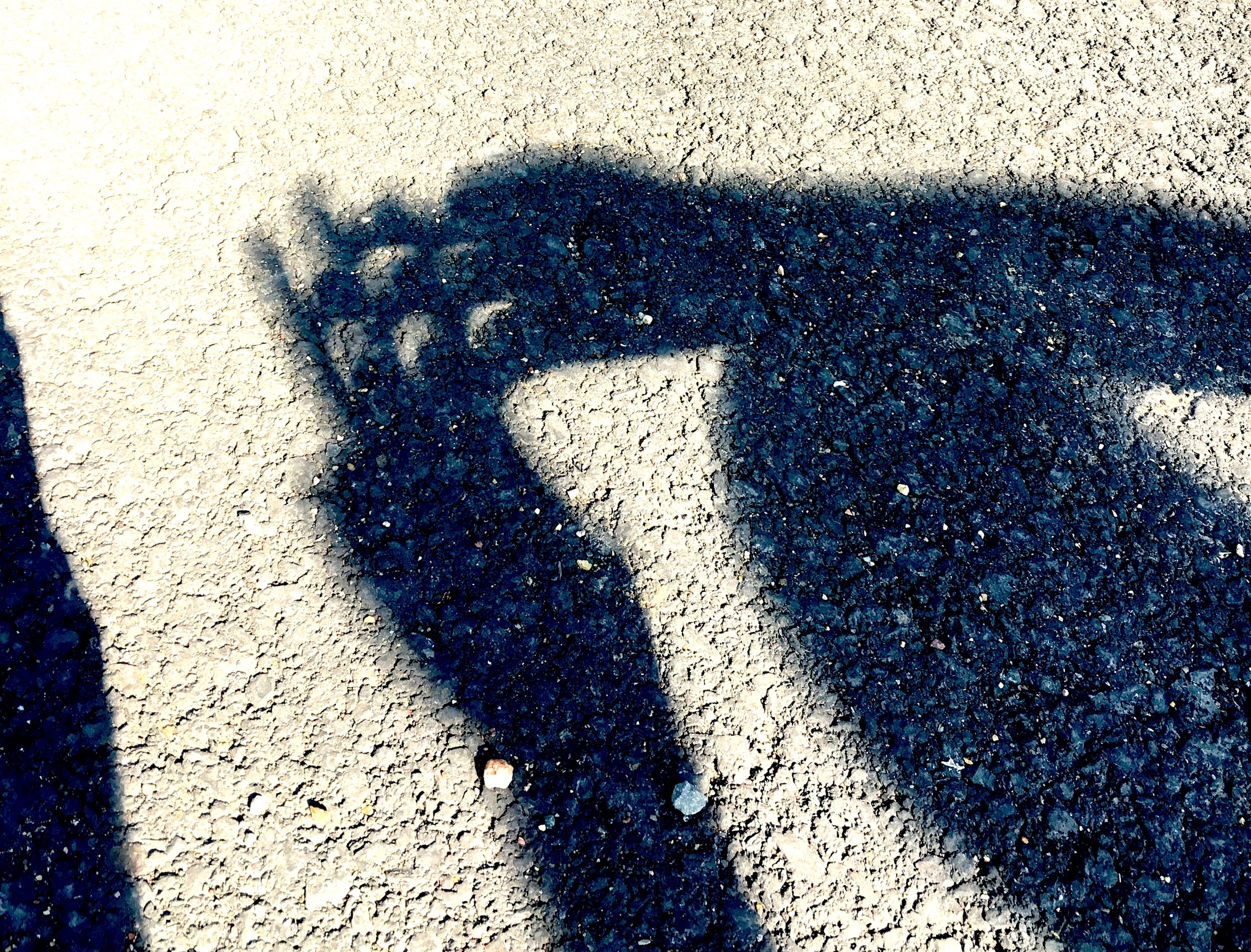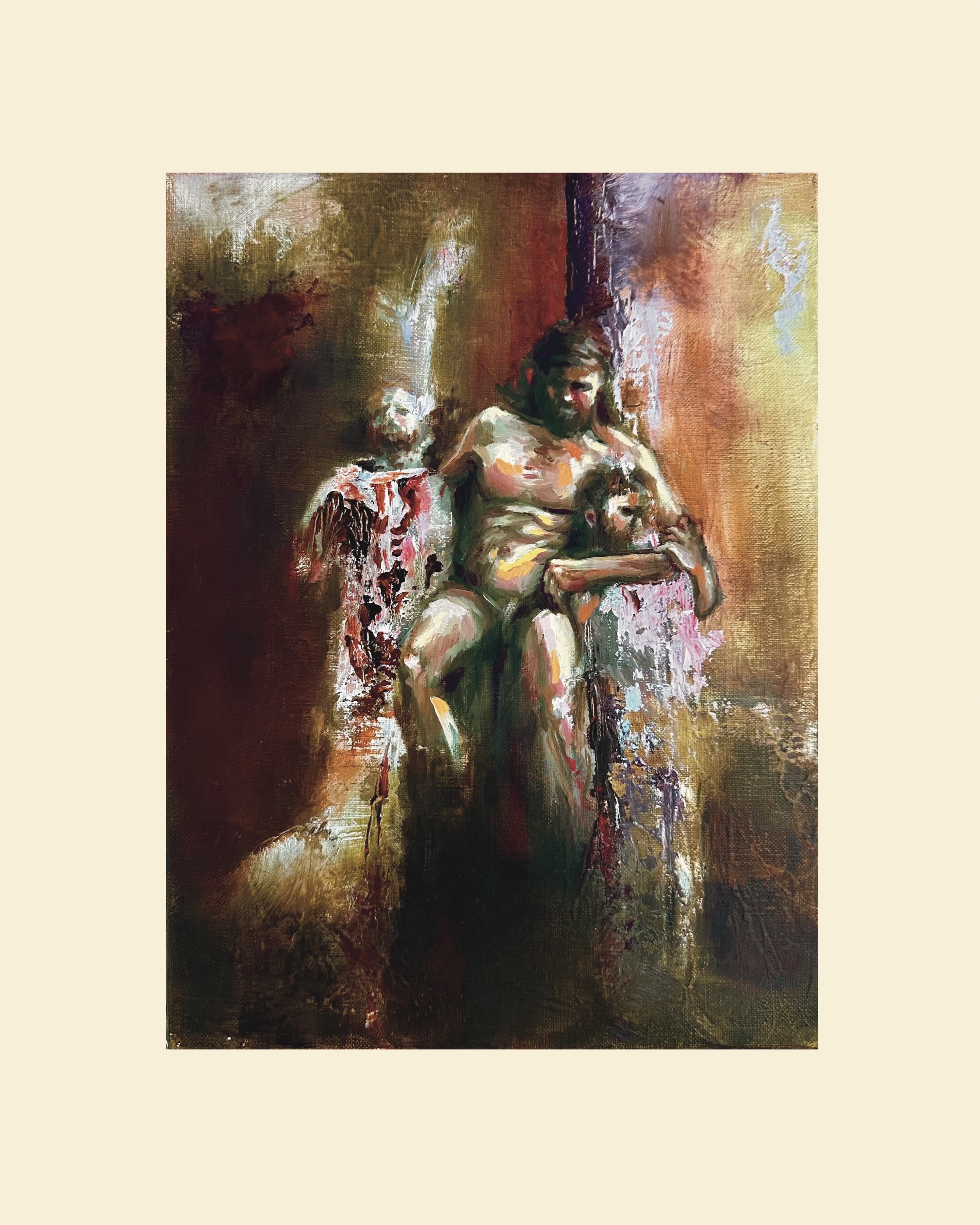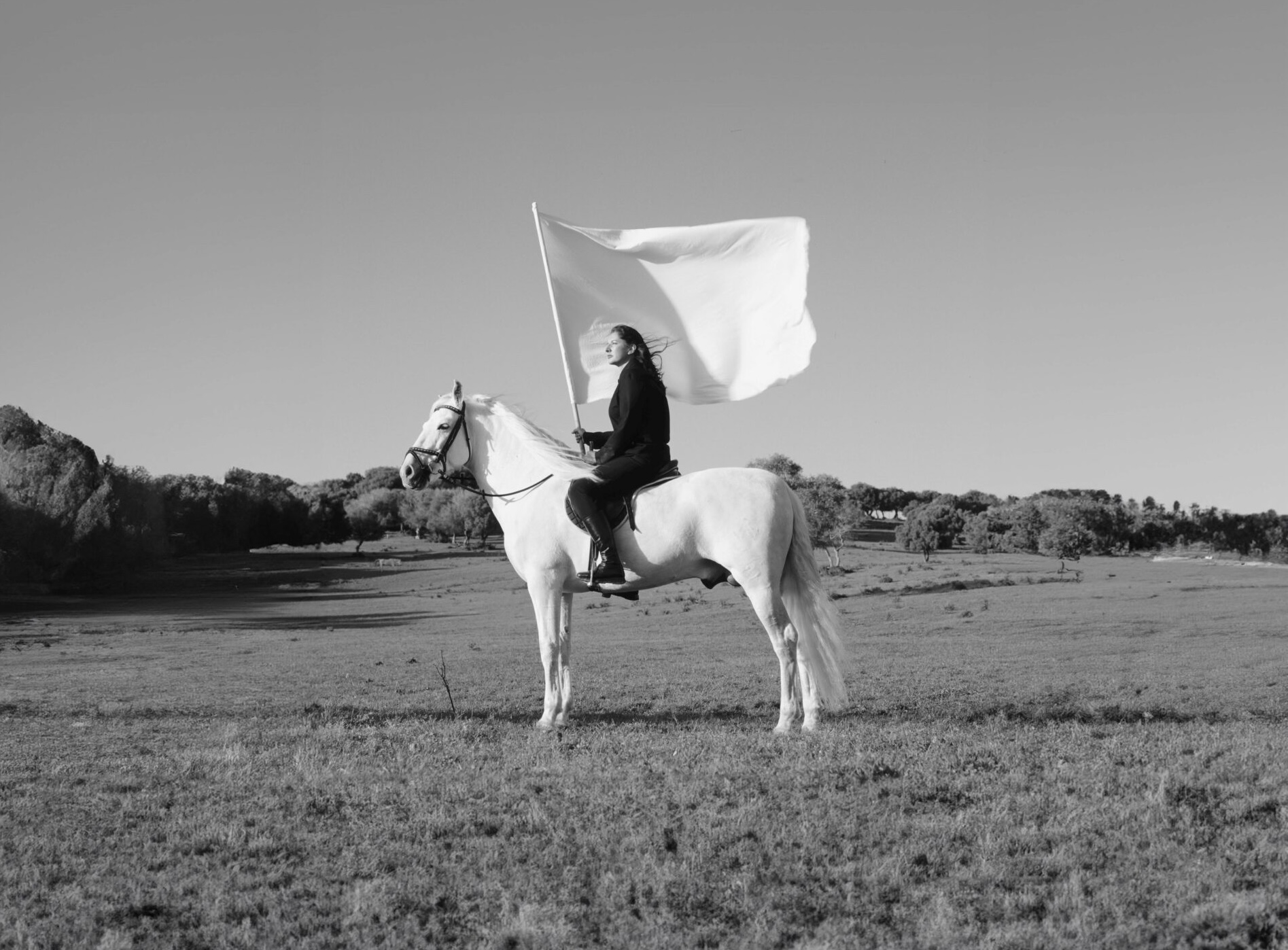

### FIRST CONTACT
We drove from LA to a ranch north of Bend, Oregon, to be here: almost 900 miles through smoke so thick it rendered the sun gazeable, a blood-red smudge. We are a vector trying to intersect other, greater vectors— the moon, the sun, the earth, and a bug-splattered Chevy rushing into alignment. We are eclipse chasing. The smoke here is from a series of fires scattered around southern Oregon, but it feels like the whole country is burning. As I write this it still does: Harvey drowns Houston, LA is ablaze, San Francisco smashes a heat record. The scientists tear their hair out as our leadership fiddles among the flames. There’s an end of days feeling in the air. Will the eclipse offer a chance for unity? Is it a harbinger of our decline? It’s hard not to load it with expectation.
The ranch where I have found myself (thanks to a dear friend’s uncle’s friend: I am the most tangentially related of the various hangers-on, but never made to feel unwelcome) is beautiful, acres of land atop a plateau surrounded by canyons and low hills, and further out snowcapped volcanic cones sawtoothing the horizon. I’m a lucky interloper into a lovely occasion—most of those gathered here are former high school classmates who graduated together in the ‘70s. The night before the eclipse the mood is celebratory. A jam band plays classics from the era, and everyone is dressed in fabulous, flamboyant outfits, wearing clothes that were in fashion in their high-school days. I flash forward to my own future, 40 years out of high school, and it doesn’t seem so bad. “I think that, if you are living your life correctly, each era is better than the last. You might miss aspects of the past, but you wouldn’t trade it for what you have today,” my friend’s father tells me. I toast the thought with a dram of Kentucky Owl Bourbon, wincing a bit at the pleasantly strong cask-strength burn. A bit sweet on the tongue, followed by a rolling spice that warms on the way down. _Things get better._ That’s heartening_._ It has proven true for the whiskey at least.


### TOTALITY
An eclipse is inherently apocalyptic. The sun is our most reliable cosmic companion. _As sure as the sun will rise,_ we say. _As sure as the sun shines_. But today the moon comes from nowhere and takes its first bite from the sun, and the bite grows as the moon slots into its predestined position— to insolently blot out the sun. It’s hard to prepare for something as fundamentally singular as witnessing a total solar eclipse. There’s no real precedent available, no similar experience to use as reference. A partial eclipse is no substitute or approximation. As Annie Dillard writes in “Total Eclipse,” her classic essay: “Seeing a partial eclipse bears the same relation to seeing a total eclipse as kissing a man does to marrying him.” You don’t realize how accustomed you are to the sun’s familiar presence in the sky until it is freakishly, troublingly, winked out in the middle of the day. You don’t realize how familiar you are with the many ways in which the sun shines (through clouds, through smog, the soft diminishing of light at sunset) until you experience a light as alien as that of a total solar eclipse. It’s an uncanny dimming that signals to the animal in you that something is deeply wrong.
There has been an upset in the natural order. The light is harsh, metallic and strange. The color drains from the grass and from the trees and from the skin of those around you. The leaves cast crescent-shaped shadows on the ground. Language falls away, insufficient to describe that for which there is no vocabulary—a brush with the terrifying sublime. You want to scream like a rooster or bark like a dog. The temperature drops quickly. You kind of want it to stop. There is a dreadful sense of determinism to the proceedings. You know that it is unstoppable.The strangeness accelerates as the moon swallows the last of the light. Then it happens. The clockwork of the cosmos is suddenly apparent, like the face has been ripped off a watch. Ringed around the horizon is a twilight glow, while above a depthless black replaces our star. The corona shimmers beautifully in wisps of purple and white. All you can do is tremble and stare.
It is impossible to imagine the panic and awe an eclipse must have inspired in generations past, who lacked a scientific framework to explain the events that unfolded above them. I knew, of course, the scientific explanation for what was happening. I understood intellectually the three-partner cosmic dance that casts the shadow. I know astronomers can predict to the second when totality will occur, and that 600 million years from now the world will witness the last kiss of the phenomena due to the moon’s inching away further from the earth year after year. This knowledge offers a shred of solidity that helps to keep you sane when you witness what the mind can’t fully fathom; without it the experience would be nearly unbearable. But even the coolly rational can’t help but be struck by the magnitude of the event—there are stories of early eclipse chasing- scientists struggling to record data due to the uncontrollable shaking of their hands.
The etymology of the word reflects the dramatic response past civilizations must have had when confronted with what was for them an inexplicable phenomenon: eclipse comes from the Greek _ekleipsis_, which means to abandon, to forsake a usual place, to fail to appear. Now imagine that the sun is not a star—it is your god, and you see your god swallowed in the sky, forsaking you. A Spanish missionary named Fray Bernardino de Sahagún in the 16th century recorded the response of the Aztecs in central Mexico when an eclipse there prompted great “tumult and disorder,” as described by Edwin C. Krupp in his book, "Beyond the Blue Horizon: Myths and Legends of the Sun, Moon, Stars and Planets." Bernardino de Sahagún writes: “There was shouting everywhere. People of light complexion were slain as sacrifices. It was thus said: ‘If the eclipse of the sun is complete, it will be dark forever! The demons of darkness will come down. They will eat men.”


### EMERGENCE
Totality lasts mere minutes, but when it is experienced it seems both an eternity and no time at all. Part of you wants it to last forever; another part of you begs the sun to return. And then, wonderfully, it does. The first shining diamond of light emerges through the craters of the moon. There is a flush of warmth. Order has been restored—_Hallelujah_! The light has never been more beautiful. You see the world anew, as if it were unmade and reformed before you. You look around at those who have watched this with you feeling sheepish and stunned. Ego both stripped and swelled. You feel utterly insignificant, dwarfed by the great, uncaring machinery, your perspective pulled from the surface of the planet to glimpse the depth of the cosmos. But you also feel like a part of something very important: the process of witnessing, of interpreting—the projection of meaning onto the universe that gives it a purpose. Without us it would be a glorious show for an empty theater. But we are here.
My friend and I make our way back home, battling through the crushing traffic that chokes the unprepared freeways of rural Oregon. It takes us four hours to go fifty miles. We turn the car off for long stretches and step outside. I grab my skateboard and cruise for a mile up the road, weaving between cars for something to do. There is a distinct lack of the enmity and frustration a jam of this scale usually produces—people are sharing water and snacks from car to car; they smile and wave as I roll by. It’s the afterglow of experiencing something en masse that strips you of your particularity. We are endeared to each other.
I’m reminded of the storied “cosmic perspective” described by astronauts—it’s hard to be provincial and self-important when you see how small we are in the scale of the universe. I know this afterglow won’t last—soon enough the bitterness and stress and petty frustrations that come with life in 21st century America will supplant it— but I hope that the millions who came out to see the Great American Eclipse can hold on to a piece of it. I’ll try to. A total eclipse occurs, on average, every eighteen months, though the next to graze North America is seven years away. I already plan to see it, organizing my future around the delicious slowness of space, a tick on a clock that highlights how fleeting our earthly rhythms and days are.
It’s a fantastic coincidence. The sun and moon are exactly the same size in the sky, so the moon can completely obscure the sun. The sun is approximately 400 times the diameter of the moon, but is also 400 times further away. What does this mean? Nothing more and nothing less than a confirmation that we live on a beautiful and rare and fantastic planet. One coincidence among billions that culminate in a deceptive sense of inevitability. But none of this is inevitable. It’s one more miracle atop a tower of miracles, adding up to the impossibility that we are here on a life-filled planet as ourselves, and the moon can cover the sun.
* * *
Written by Sid Feddema
Title Image by Hans Kokx
 
### FIRST CONTACT
We drove from LA to a ranch north of Bend, Oregon, to be here: almost 900 miles through smoke so thick it rendered the sun gazeable, a blood-red smudge. We are a vector trying to intersect other, greater vectors— the moon, the sun, the earth, and a bug-splattered Chevy rushing into alignment. We are eclipse chasing. The smoke here is from a series of fires scattered around southern Oregon, but it feels like the whole country is burning. As I write this it still does: Harvey drowns Houston, LA is ablaze, San Francisco smashes a heat record. The scientists tear their hair out as our leadership fiddles among the flames. There’s an end of days feeling in the air. Will the eclipse offer a chance for unity? Is it a harbinger of our decline? It’s hard not to load it with expectation.
The ranch where I have found myself (thanks to a dear friend’s uncle’s friend: I am the most tangentially related of the various hangers-on, but never made to feel unwelcome) is beautiful, acres of land atop a plateau surrounded by canyons and low hills, and further out snowcapped volcanic cones sawtoothing the horizon. I’m a lucky interloper into a lovely occasion—most of those gathered here are former high school classmates who graduated together in the ‘70s. The night before the eclipse the mood is celebratory. A jam band plays classics from the era, and everyone is dressed in fabulous, flamboyant outfits, wearing clothes that were in fashion in their high-school days. I flash forward to my own future, 40 years out of high school, and it doesn’t seem so bad. “I think that, if you are living your life correctly, each era is better than the last. You might miss aspects of the past, but you wouldn’t trade it for what you have today,” my friend’s father tells me. I toast the thought with a dram of Kentucky Owl Bourbon, wincing a bit at the pleasantly strong cask-strength burn. A bit sweet on the tongue, followed by a rolling spice that warms on the way down. _Things get better._ That’s heartening_._ It has proven true for the whiskey at least.

### FIRST CONTACT
We drove from LA to a ranch north of Bend, Oregon, to be here: almost 900 miles through smoke so thick it rendered the sun gazeable, a blood-red smudge. We are a vector trying to intersect other, greater vectors— the moon, the sun, the earth, and a bug-splattered Chevy rushing into alignment. We are eclipse chasing. The smoke here is from a series of fires scattered around southern Oregon, but it feels like the whole country is burning. As I write this it still does: Harvey drowns Houston, LA is ablaze, San Francisco smashes a heat record. The scientists tear their hair out as our leadership fiddles among the flames. There’s an end of days feeling in the air. Will the eclipse offer a chance for unity? Is it a harbinger of our decline? It’s hard not to load it with expectation.
The ranch where I have found myself (thanks to a dear friend’s uncle’s friend: I am the most tangentially related of the various hangers-on, but never made to feel unwelcome) is beautiful, acres of land atop a plateau surrounded by canyons and low hills, and further out snowcapped volcanic cones sawtoothing the horizon. I’m a lucky interloper into a lovely occasion—most of those gathered here are former high school classmates who graduated together in the ‘70s. The night before the eclipse the mood is celebratory. A jam band plays classics from the era, and everyone is dressed in fabulous, flamboyant outfits, wearing clothes that were in fashion in their high-school days. I flash forward to my own future, 40 years out of high school, and it doesn’t seem so bad. “I think that, if you are living your life correctly, each era is better than the last. You might miss aspects of the past, but you wouldn’t trade it for what you have today,” my friend’s father tells me. I toast the thought with a dram of Kentucky Owl Bourbon, wincing a bit at the pleasantly strong cask-strength burn. A bit sweet on the tongue, followed by a rolling spice that warms on the way down. _Things get better._ That’s heartening_._ It has proven true for the whiskey at least.
 
### TOTALITY
An eclipse is inherently apocalyptic. The sun is our most reliable cosmic companion. _As sure as the sun will rise,_ we say. _As sure as the sun shines_. But today the moon comes from nowhere and takes its first bite from the sun, and the bite grows as the moon slots into its predestined position— to insolently blot out the sun. It’s hard to prepare for something as fundamentally singular as witnessing a total solar eclipse. There’s no real precedent available, no similar experience to use as reference. A partial eclipse is no substitute or approximation. As Annie Dillard writes in “Total Eclipse,” her classic essay: “Seeing a partial eclipse bears the same relation to seeing a total eclipse as kissing a man does to marrying him.” You don’t realize how accustomed you are to the sun’s familiar presence in the sky until it is freakishly, troublingly, winked out in the middle of the day. You don’t realize how familiar you are with the many ways in which the sun shines (through clouds, through smog, the soft diminishing of light at sunset) until you experience a light as alien as that of a total solar eclipse. It’s an uncanny dimming that signals to the animal in you that something is deeply wrong.
There has been an upset in the natural order. The light is harsh, metallic and strange. The color drains from the grass and from the trees and from the skin of those around you. The leaves cast crescent-shaped shadows on the ground. Language falls away, insufficient to describe that for which there is no vocabulary—a brush with the terrifying sublime. You want to scream like a rooster or bark like a dog. The temperature drops quickly. You kind of want it to stop. There is a dreadful sense of determinism to the proceedings. You know that it is unstoppable.The strangeness accelerates as the moon swallows the last of the light. Then it happens. The clockwork of the cosmos is suddenly apparent, like the face has been ripped off a watch. Ringed around the horizon is a twilight glow, while above a depthless black replaces our star. The corona shimmers beautifully in wisps of purple and white. All you can do is tremble and stare.
It is impossible to imagine the panic and awe an eclipse must have inspired in generations past, who lacked a scientific framework to explain the events that unfolded above them. I knew, of course, the scientific explanation for what was happening. I understood intellectually the three-partner cosmic dance that casts the shadow. I know astronomers can predict to the second when totality will occur, and that 600 million years from now the world will witness the last kiss of the phenomena due to the moon’s inching away further from the earth year after year. This knowledge offers a shred of solidity that helps to keep you sane when you witness what the mind can’t fully fathom; without it the experience would be nearly unbearable. But even the coolly rational can’t help but be struck by the magnitude of the event—there are stories of early eclipse chasing- scientists struggling to record data due to the uncontrollable shaking of their hands.
The etymology of the word reflects the dramatic response past civilizations must have had when confronted with what was for them an inexplicable phenomenon: eclipse comes from the Greek _ekleipsis_, which means to abandon, to forsake a usual place, to fail to appear. Now imagine that the sun is not a star—it is your god, and you see your god swallowed in the sky, forsaking you. A Spanish missionary named Fray Bernardino de Sahagún in the 16th century recorded the response of the Aztecs in central Mexico when an eclipse there prompted great “tumult and disorder,” as described by Edwin C. Krupp in his book, "Beyond the Blue Horizon: Myths and Legends of the Sun, Moon, Stars and Planets." Bernardino de Sahagún writes: “There was shouting everywhere. People of light complexion were slain as sacrifices. It was thus said: ‘If the eclipse of the sun is complete, it will be dark forever! The demons of darkness will come down. They will eat men.”

### TOTALITY
An eclipse is inherently apocalyptic. The sun is our most reliable cosmic companion. _As sure as the sun will rise,_ we say. _As sure as the sun shines_. But today the moon comes from nowhere and takes its first bite from the sun, and the bite grows as the moon slots into its predestined position— to insolently blot out the sun. It’s hard to prepare for something as fundamentally singular as witnessing a total solar eclipse. There’s no real precedent available, no similar experience to use as reference. A partial eclipse is no substitute or approximation. As Annie Dillard writes in “Total Eclipse,” her classic essay: “Seeing a partial eclipse bears the same relation to seeing a total eclipse as kissing a man does to marrying him.” You don’t realize how accustomed you are to the sun’s familiar presence in the sky until it is freakishly, troublingly, winked out in the middle of the day. You don’t realize how familiar you are with the many ways in which the sun shines (through clouds, through smog, the soft diminishing of light at sunset) until you experience a light as alien as that of a total solar eclipse. It’s an uncanny dimming that signals to the animal in you that something is deeply wrong.
There has been an upset in the natural order. The light is harsh, metallic and strange. The color drains from the grass and from the trees and from the skin of those around you. The leaves cast crescent-shaped shadows on the ground. Language falls away, insufficient to describe that for which there is no vocabulary—a brush with the terrifying sublime. You want to scream like a rooster or bark like a dog. The temperature drops quickly. You kind of want it to stop. There is a dreadful sense of determinism to the proceedings. You know that it is unstoppable.The strangeness accelerates as the moon swallows the last of the light. Then it happens. The clockwork of the cosmos is suddenly apparent, like the face has been ripped off a watch. Ringed around the horizon is a twilight glow, while above a depthless black replaces our star. The corona shimmers beautifully in wisps of purple and white. All you can do is tremble and stare.
It is impossible to imagine the panic and awe an eclipse must have inspired in generations past, who lacked a scientific framework to explain the events that unfolded above them. I knew, of course, the scientific explanation for what was happening. I understood intellectually the three-partner cosmic dance that casts the shadow. I know astronomers can predict to the second when totality will occur, and that 600 million years from now the world will witness the last kiss of the phenomena due to the moon’s inching away further from the earth year after year. This knowledge offers a shred of solidity that helps to keep you sane when you witness what the mind can’t fully fathom; without it the experience would be nearly unbearable. But even the coolly rational can’t help but be struck by the magnitude of the event—there are stories of early eclipse chasing- scientists struggling to record data due to the uncontrollable shaking of their hands.
The etymology of the word reflects the dramatic response past civilizations must have had when confronted with what was for them an inexplicable phenomenon: eclipse comes from the Greek _ekleipsis_, which means to abandon, to forsake a usual place, to fail to appear. Now imagine that the sun is not a star—it is your god, and you see your god swallowed in the sky, forsaking you. A Spanish missionary named Fray Bernardino de Sahagún in the 16th century recorded the response of the Aztecs in central Mexico when an eclipse there prompted great “tumult and disorder,” as described by Edwin C. Krupp in his book, "Beyond the Blue Horizon: Myths and Legends of the Sun, Moon, Stars and Planets." Bernardino de Sahagún writes: “There was shouting everywhere. People of light complexion were slain as sacrifices. It was thus said: ‘If the eclipse of the sun is complete, it will be dark forever! The demons of darkness will come down. They will eat men.”
 
### EMERGENCE
Totality lasts mere minutes, but when it is experienced it seems both an eternity and no time at all. Part of you wants it to last forever; another part of you begs the sun to return. And then, wonderfully, it does. The first shining diamond of light emerges through the craters of the moon. There is a flush of warmth. Order has been restored—_Hallelujah_! The light has never been more beautiful. You see the world anew, as if it were unmade and reformed before you. You look around at those who have watched this with you feeling sheepish and stunned. Ego both stripped and swelled. You feel utterly insignificant, dwarfed by the great, uncaring machinery, your perspective pulled from the surface of the planet to glimpse the depth of the cosmos. But you also feel like a part of something very important: the process of witnessing, of interpreting—the projection of meaning onto the universe that gives it a purpose. Without us it would be a glorious show for an empty theater. But we are here.
My friend and I make our way back home, battling through the crushing traffic that chokes the unprepared freeways of rural Oregon. It takes us four hours to go fifty miles. We turn the car off for long stretches and step outside. I grab my skateboard and cruise for a mile up the road, weaving between cars for something to do. There is a distinct lack of the enmity and frustration a jam of this scale usually produces—people are sharing water and snacks from car to car; they smile and wave as I roll by. It’s the afterglow of experiencing something en masse that strips you of your particularity. We are endeared to each other.
I’m reminded of the storied “cosmic perspective” described by astronauts—it’s hard to be provincial and self-important when you see how small we are in the scale of the universe. I know this afterglow won’t last—soon enough the bitterness and stress and petty frustrations that come with life in 21st century America will supplant it— but I hope that the millions who came out to see the Great American Eclipse can hold on to a piece of it. I’ll try to. A total eclipse occurs, on average, every eighteen months, though the next to graze North America is seven years away. I already plan to see it, organizing my future around the delicious slowness of space, a tick on a clock that highlights how fleeting our earthly rhythms and days are.
It’s a fantastic coincidence. The sun and moon are exactly the same size in the sky, so the moon can completely obscure the sun. The sun is approximately 400 times the diameter of the moon, but is also 400 times further away. What does this mean? Nothing more and nothing less than a confirmation that we live on a beautiful and rare and fantastic planet. One coincidence among billions that culminate in a deceptive sense of inevitability. But none of this is inevitable. It’s one more miracle atop a tower of miracles, adding up to the impossibility that we are here on a life-filled planet as ourselves, and the moon can cover the sun.
* * *
Written by Sid Feddema
Title Image by Hans Kokx

### EMERGENCE
Totality lasts mere minutes, but when it is experienced it seems both an eternity and no time at all. Part of you wants it to last forever; another part of you begs the sun to return. And then, wonderfully, it does. The first shining diamond of light emerges through the craters of the moon. There is a flush of warmth. Order has been restored—_Hallelujah_! The light has never been more beautiful. You see the world anew, as if it were unmade and reformed before you. You look around at those who have watched this with you feeling sheepish and stunned. Ego both stripped and swelled. You feel utterly insignificant, dwarfed by the great, uncaring machinery, your perspective pulled from the surface of the planet to glimpse the depth of the cosmos. But you also feel like a part of something very important: the process of witnessing, of interpreting—the projection of meaning onto the universe that gives it a purpose. Without us it would be a glorious show for an empty theater. But we are here.
My friend and I make our way back home, battling through the crushing traffic that chokes the unprepared freeways of rural Oregon. It takes us four hours to go fifty miles. We turn the car off for long stretches and step outside. I grab my skateboard and cruise for a mile up the road, weaving between cars for something to do. There is a distinct lack of the enmity and frustration a jam of this scale usually produces—people are sharing water and snacks from car to car; they smile and wave as I roll by. It’s the afterglow of experiencing something en masse that strips you of your particularity. We are endeared to each other.
I’m reminded of the storied “cosmic perspective” described by astronauts—it’s hard to be provincial and self-important when you see how small we are in the scale of the universe. I know this afterglow won’t last—soon enough the bitterness and stress and petty frustrations that come with life in 21st century America will supplant it— but I hope that the millions who came out to see the Great American Eclipse can hold on to a piece of it. I’ll try to. A total eclipse occurs, on average, every eighteen months, though the next to graze North America is seven years away. I already plan to see it, organizing my future around the delicious slowness of space, a tick on a clock that highlights how fleeting our earthly rhythms and days are.
It’s a fantastic coincidence. The sun and moon are exactly the same size in the sky, so the moon can completely obscure the sun. The sun is approximately 400 times the diameter of the moon, but is also 400 times further away. What does this mean? Nothing more and nothing less than a confirmation that we live on a beautiful and rare and fantastic planet. One coincidence among billions that culminate in a deceptive sense of inevitability. But none of this is inevitable. It’s one more miracle atop a tower of miracles, adding up to the impossibility that we are here on a life-filled planet as ourselves, and the moon can cover the sun.
* * *
Written by Sid Feddema
Title Image by Hans Kokx









.JPG)
.jpg)







